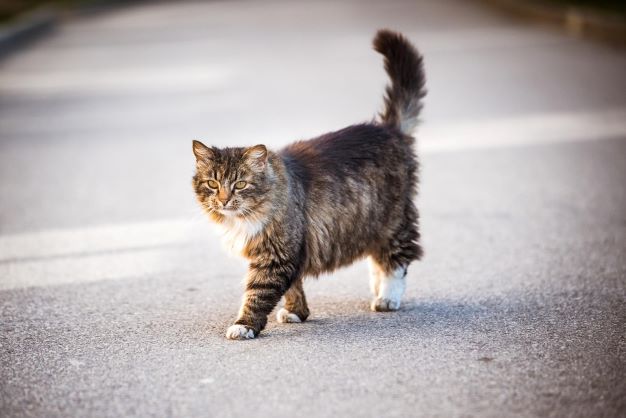11 Fascinating Japanese Superstitions
The Japanese culture is rich in superstitions and beliefs. Some of these relate to the supernatural, others are about luck and fortune. Many of these superstitions have their roots in Buddhism or Shintoism, which are popular religions in Japan. Here are some interesting Japanese superstitions that might surprise you:

#1. If a black cat crosses your path from left to right, it bodes bad luck. But if it crosses from right to left, it’s good luck.
In Japan, if a black cat crosses your path from left to right, it’s considered bad luck. But if the cat crosses from right to left, it’s good luck. This superstition stems from the belief that cats are messengers of the gods and when they cross your path in this way, you’re being warned by them that something bad is about to happen.
On the other hand, crossing paths with a white cat is another sign of great fortune (as long as it washes its face before walking past you). In Japanese mythology, white cats are associated with prosperity and happiness—so much so that many people keep them around their house in order to attract these qualities into their own lives! These good luck cat figurines are called maneki neko. You see them a lot at souvenir shops in Japan.
#2. Don’t sleep with your head facing north.
The Japanese have a superstition that if you sleep with your head facing north, the ghost of your grandfather will come to haunt you. That’s right: if you lay down with your head in the direction of the afterlife, it’s only a matter of time before some demonic grandfathers show up and give you nightmares (or worse).
However, there are other reasons why sleeping with your face pointed toward where ghosts live isn’t recommended. Ghosts are believed to be attracted to negative energy, and since most people don’t want dead spirits hanging around their rooms at night—let alone sleeping next to them—the safest way is to lie parallel to the north-south axis of Tokyo.
For those who aren’t familiar with this concept: Japan is located on an island chain that runs from north east Asia through Japan and down into Korea; it’s also situated east from China in relation to mainland Asia. Just picture yourself lying flat on a map—you’ll see what we mean!
#3. No umbrellas in the house.
The most interesting superstition in Japan is definitely the umbrella taboo. As with many Japanese superstitions, this one has multiple layers of intricacy and meaning.
Umbrellas are associated with funerals and bad luck because they’re used to shield mourners from the sun as they walk through a cemetery, but also because they’re considered an incarnation of the Shinto deity Amaterasu, the sun goddess who allowed her brother Susanoo to use her blood to create humans after he stole her eye (and then tricked him into giving it back). The umbrellas that were carried by mourners during tri-annual festivals honoring Amaterasu were yellow—the color of mourning—and had curved tips shaped like a crescent moon that represented her body.
#4. If a knife or scissors falls on the floor, it’s bad news.
If a knife or scissors falls on the floor, it’s bad news. This superstition dates back to around 1200 B.C., when people believed that anything that fell from above would cut the life short of anyone who walked under it. Today, this superstition is still common in many countries around the world, including Japan
If you’re in Japan and see a knife or pair of scissors fall from someone’s hand (or even just out of their bag), don’t worry about how long it will be before your luck runs out—just grab them quick!
#5. You should not leave your chopsticks sticking up in food, especially rice.
The reason this is considered bad luck is because, in Japanese culture, it’s believed that the spirit of a dead person will enter your body through your mouth if you leave your chopsticks sticking up. To avoid this, place them on top of the rice bowl and cover with a special cover called bukuro. If you accidentally forget to put them down before eating or even if you do put them down but then remember later on, don’t worry! Just take the chopsticks out and stick them into a piece of food sitting at the bottom of your dish (this should be an apple or something else relatively soft). The apples can also be dipped in soy sauce or other sauces as well- just make sure not to eat any part of the fruit after doing so!
#6. If you whistle at night, you will attract snakes – and if you whistle inside, you will attract ghosts.
This superstition is based on the reason that monsters or snakes will be triggered by the sound of whistling. Snakes also refer to shady people who are active at night and they use whistling to communicate with each other.
#7. Number seven is very lucky.
Seven is the lucky number in Japan due to its root in Buddhism because seven is the number of steps to reach the realm of nirvana. The significance of the number seven can be seen in the name of the Seven Gods of Luck in Japanese folklore, the sichi-fuku-jin. Sichi means seven in Japanese, and it can also be pronounced nana. In Japan, people celebrate the 7th day of New Year by eating nanakusa, a seven-herb porridge which is believed to chase illness all year round. To learn more about Japanese, you can sign up for a trial Japanese class.
#8. The number four is not popular among Japanese people as it means death in their language. Also, any gifts of four items are not accepted in Japan.
One of the most interesting superstitions in Japan is that the number four is not popular among Japanese people as the word shi means death in Japanese. Also, any gifts of four items are not accepted in Japan or given to others. This includes gifts such as a four-leaf clover or even a gift box with four sides!
Although this may seem like quite an odd superstition, this belief stems from history. In ancient times, the Japanese people believed that ghosts haunted the world and they were afraid of them because they could do harm if they wanted to do so.
#9. The number nine is considered unlucky because when pronounced in Japanese, it sounds like “suffering” (ku) and “pain” (nainai).
The number nine is considered unlucky because when pronounced in Japanese, it sounds like “suffering” (ku) and “pain” (nainai). The association isn’t universal to all Japanese people; however, many tend to avoid using it at all costs—even going so far as writing the number without connecting dots as a way of avoiding any sort of association between numbers eight and nine.
Because of the two unlucky numbers above, four and nine, Japanese airplanes do not have seat number 49 as it is believed to bring death and suffering, certainly unwanted during a flight.
#10. If a comb falls to the floor, it may mean death.
If a comb drops to the floor, it could mean that someone will die. It is believed that combs are symbols of snakes, which are considered to be an omen of death. A fallen comb also symbolizes the Goddess of Mercy, a Buddhist deity, and when she leaves you, there is no protection against evil spirits anymore.
#11. Cutting your nails at night is bad luck.
You probably know that cutting your nails at night is bad luck. This superstition dates back to the days when people believed that nails grow during sleep. The devil may come and take your soul if you cut your nails at night, so you should only trim them in daylight hours.
As fascinating as they are, you may treat these superstitions with a pinch of salt. However, they are still practiced today. If you go to Japan, try not to break them!



